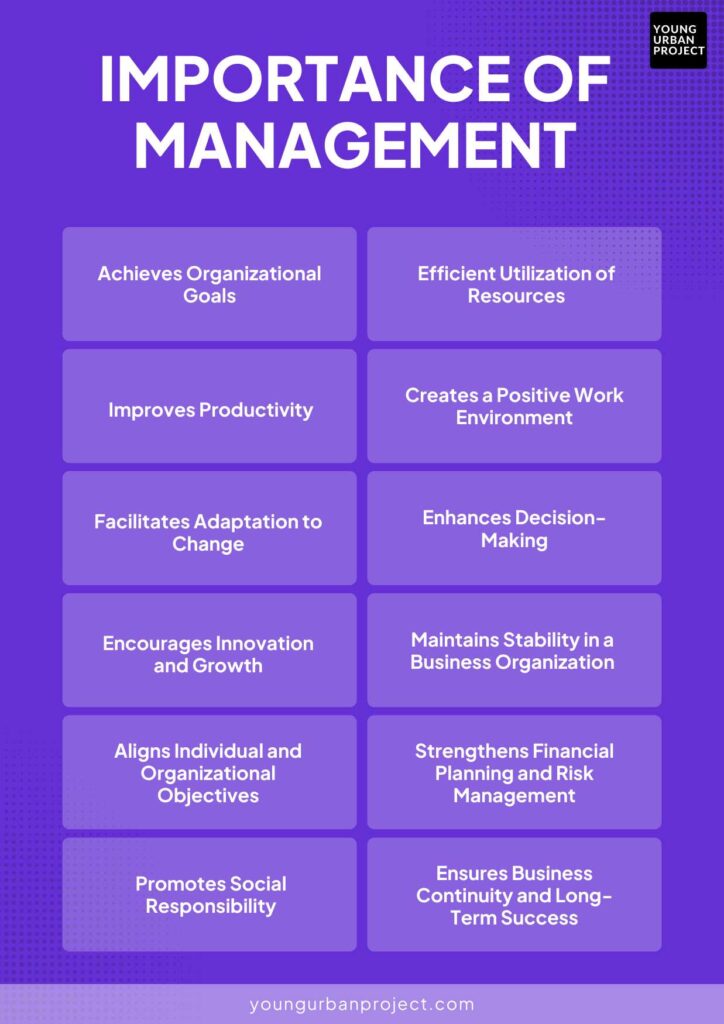There’s an invisible force in any successful enterprise that keeps things running. This force is called management. It doesn’t just keep the wheels turning; it also drives innovation, promotes a positive work environment, and makes sure that objectives are met with precision. Management is a part of any organization where strategy meets execution and vision transforms into reality.
Table of Contents
So, let’s understand the importance of management and how it shapes the success of every business.
What Does Management Mean?
It is what gets things done through people. It includes planning, organizing, leading, and keeping everything on track so that goals are met. Think of it as making sure a team works smoothly, whether it’s a small business or a big company.
Good management helps avoid confusion, keeps everyone focused, and makes sure resources like money, time, and people are used wisely. Without it, even the best ideas can fall apart.
Also read: What is Management?
What is the Importance of Management?

1. Achieves Organizational Goals
Management helps an organization achieve its goals. Think of a business as a football team; everyone needs to work toward the same goal. It makes sure all the people of an organization are on the same page by setting clear goals and creating plans to achieve them. It helps guide the team so that each department or team member knows exactly what they need to do.
Without it, it’s easy for everyone to go in different directions, and the business would struggle to reach its targets. Clear goals and proper management lead to a focused and successful organization.
2. Efficient Utilization of Resources
Every business has limited resources like time, money, and people. Management helps the company use these resources wisely so nothing is wasted. For example, instead of spending too much money on things that don’t bring value, it ensures that money is spent on things that help the business grow.
It also makes sure that the team’s time is used efficiently. Management plays a key role in planning, organizing, and assigning tasks so everyone is doing what they’re best at and using resources in the most productive way.
3. Improves Productivity
One of the biggest tasks in management is to help the team work efficiently. When it is done right, it removes obstacles that slow people down. It sets up the right systems and processes so work gets done more smoothly and quickly. For example, a manager might organize the workflow to make sure that each task flows into the next.
Management makes sure that everyone has the right tools and support they need to do their best work. As a result, employees are more productive, deadlines are met, and the organization runs like a well-oiled machine.
Also Read: Evolution of Management
4. Creates a Positive Work Environment
A positive work environment is crucial for employee happiness and success. Management plays a big role in creating this environment. It focuses on open communication, helps solve problems, and encourages collaboration.
When people are happy in their jobs, they work better and are more committed to the company. Management also encourages employees to grow in their careers, which leads to higher job satisfaction. A positive work environment makes people more motivated and loyal to the company.
5. Facilitates Adaptation to Change
The world of business is constantly changing, whether it’s due to new technologies, shifts in the market, or customer preferences. Management plays a crucial role in helping the organization adjust to these changes. For example, if a new technology becomes popular in the industry, it helps the company adopt and integrate it. Or, if customer tastes change, it makes sure the business adapts its products or services.
Being flexible and able to adjust is key to staying competitive in today’s fast-paced world. Management ensures that the company is always ready for change and can stay ahead of the curve.

Enroll Now: Product Marketing Course
6. Enhances Decision-Making
Good decision-making is important for the success of any organization. Management helps in making smart decisions by gathering the right information and carefully considering all options. For example, a manager might collect data about customer preferences before launching a new product.
By analyzing all the facts, managers can make the best choice, which helps the company grow. It also helps prevent poor decisions by providing guidelines and setting clear objectives. When management is strong, the company makes better decisions, which leads to success and growth.
7. Encourages Innovation and Growth
Businesses today need to be innovative to succeed. Management encourages new ideas by creating an environment where employees can share their thoughts and try new things. Strong management supports creative solutions, whether that’s introducing new products, finding better ways to do business, or using new technologies.
When managers encourage innovation, the company can stay ahead of the competition and continue to grow. This helps the company find new opportunities and keeps employees engaged by allowing them to be part of exciting projects.
Also Read: What Is Marketing Management?
8. Maintains Stability in a Business Organization
Management keeps stability in check in an organization by keeping things organized and running smoothly. Without it, a company could become disorganized, with tasks left undone and goals unmet. It sets clear roles, responsibilities, and procedures so everyone knows what to expect. This helps prevent confusion and conflict within the team.
When management is strong, everyone has a clear sense of purpose, and the company is able to maintain steady growth, even when facing challenges. It also ensures that operations continue efficiently, even when changes or problems occur.
9. Aligns Individual and Organizational Objectives
One of the challenges in any business is making sure that each person’s goals align with the company’s goals. Management plays a key role in helping employees see how their work fits into the larger picture. For example, if an employee has a personal goal to improve their skills, it makes sure that this goal aligns with the company’s goals, like improving overall performance.
By aligning personal and organizational goals, management ensures that employees are motivated and committed to the business’s success. When everyone is working toward the same objectives, it’s easier for the company to achieve them.
10. Strengthens Financial Planning and Risk Management
Management is crucial for keeping track of money. Financial management helps businesses plan how to spend money wisely and how to earn enough to cover costs and grow. For example, it will create a budget, track expenses, and make sure the company is investing in things that will bring in more revenue.
Risk management also helps identify potential risks, such as market changes or supply chain issues, and prepares solutions for them. By managing money and risks properly, management helps ensure the business stays financially healthy and successful.
11. Promotes Social Responsibility
More and more businesses are being held accountable for their impact on the world. Management promotes social responsibility by making sure the business operates ethically. This could mean reducing waste, using environmentally friendly practices, or supporting local communities.
Companies that care about their social responsibility are seen as more trustworthy and attract loyal customers. Management makes sure the business is doing the right thing for society, which benefits the community and strengthens the company’s reputation.
12. Ensures Business Continuity and Long-Term Success
Finally, management is essential for ensuring that a business can continue growing over time. It helps the company plan for the future by setting long-term goals and strategies. By looking ahead, it can prepare for challenges and opportunities, ensuring that the business continues to evolve and stay competitive.
This involves anticipating market changes, managing risks, and investing in future projects. Management is responsible for keeping the company on track, even when times are tough, and guiding it toward long-term success.
Also read: Scope of Management: A Detailed Breakdown
Key Management Skills

Let’s face it: managing a team or an organization doesn’t mean you have to do everything yourself. A good manager knows how to delegate, lead, and support their team in ways that make everything run smoothly. But how do you do that? What skills do you need to truly be an effective manager? Well, every successful manager relies on a few core key management skills. Let’s break them down.
1. Technical Skills
Think of technical skills like the tools in your toolbox. If you’re managing a team that builds websites, for example, you don’t need to be the best coder, but having a basic understanding of how websites are made can go a long way. Knowing the lingo and being able to troubleshoot the basics helps you understand what your team is dealing with on a daily basis. When you’re aware of the technical stuff, you can communicate better and give feedback that’s actually useful.
Did you know? Millennials say they want more feedback, but only 17% of them strongly agree they receive regular or meaningful feedback from their manager.
So, if a developer is stuck on a coding issue, you can step in, understand what’s going on, and either help directly or know who to bring in. The point isn’t to be an expert at everything but to know enough so you can guide your team through any roadblocks.
2. Interpersonal Skills
Being a manager isn’t just about the work—it’s about the people you’re working with. Interpersonal skills are everything here. You need to be able to talk to your team, build trust, and understand their concerns. Communication is key, not just in explaining things clearly, but in listening too.
Let’s say you’ve got someone on your team who’s having a tough time with a project. Being able to read the situation, understand what’s going wrong, and then talk through it calmly makes all the difference. People need to feel heard, understood, and respected to really give their best. It’s not just about telling someone what to do; it’s about helping them get there in the best way possible.
3. Conceptual Skills
A manager’s role isn’t just about looking at the tasks in front of them—it’s about seeing the big picture. That’s where conceptual skills come in. These are all about being able to understand how different parts of the organization or project fit together and how changes in one area might impact others.
For example, if you’re working on a new marketing campaign, you need to understand how it impacts not just marketing but also sales, customer support, and even product development. It’s like looking at a chessboard and knowing how every piece moves. A good manager doesn’t get lost in the weeds; they can step back, see how things connect, and make decisions that move the entire team forward.
Also read: Importance of Marketing Management
4. Time Management
We all know there’s never enough time in the day. As a manager, how you manage your time can make or break a project. This is where prioritizing tasks comes in. It’s about making sure the most important things get done first. When you’re juggling deadlines and a million to-do lists, you need to know what deserves your attention most.
Effectively managing time also means knowing when to delegate. If you try to do everything yourself, you’ll burn out, and things will slip through the cracks. But if you can break down your tasks, assign the right ones to the right people, and keep track of everything, your team will stay on top of things without feeling overwhelmed.
5. Problem-Solving Skills
No matter how well things are going, problems will always pop up. The key is knowing how to solve them. Managers with strong problem-solving skills can quickly identify what’s going wrong, figure out why it’s happening, and come up with practical solutions. The trick is to approach problems with a calm mindset and a clear plan of action.
For example, if there’s a delay in a project, instead of stressing out, a manager needs to think: what caused the delay? What can we do to fix it? And how do we make sure it doesn’t happen again? Good problem-solving is all about being proactive and having the confidence to make decisions that keep things moving forward.
Also Read: What is Product Management?
Did you know? Employees who have a manager who is always willing to listen to their work-related problems are 62% less likely to be burned out.
The Impact of Management on Business Success

So why is effective management so crucial? Well, it’s simple—things can fall apart quickly without strong management. A company’s success depends on its people and how they work together. That’s where management comes in. A great manager is like a coach, making sure everyone is in the right position, motivated, and working toward the same goals.
Good management makes sure that everything is organized and running smoothly. From setting clear objectives to making sure resources are being used effectively, a manager ensures that everything is aligned. When everyone is on the same page, it’s a lot easier to meet deadlines, solve problems, and ultimately reach the business’s goals. Without that kind of leadership, things can get chaotic. Projects can get delayed, team morale can drop, and productivity can suffer.
But the impact of management goes beyond just keeping things in order. It also sets the stage for long-term growth. A great manager not only makes sure things are running smoothly today but also plans for the future. They think about how to adapt to changes in the industry, what trends are on the horizon, and how to keep the team on track even when things shift. Effective management doesn’t just react to problems—it anticipates them and has a plan ready.
At the same time, management helps create a positive work environment. When people feel supported, heard, and given the resources they need to succeed, they perform better. That’s why leadership and communication are so important. When management is strong, employees are happier, more productive, and more likely to stay with the company for the long haul.
Without good managers, the whole business can suffer. Projects might get delayed, resources could be wasted, and employees might feel unsupported. That’s why it plays such an important role in shaping a company’s success. It’s not just about keeping the wheels turning today—it’s about building a foundation for tomorrow.
Wrapping up…
In essence, management is essential for any organization’s smooth operation and success. It aligns resources, motivates staff, and ensures that goals are met efficiently. By understanding and implementing effective management practices, businesses can navigate challenges and achieve sustained success.
FAQs: Importance of Management
1. What is the primary role of management in an organization?
Management plans, organizes, leads, and controls resources like people, time, and money to achieve company goals efficiently. It ensures teams work well together, meet objectives, and keep the business running smoothly.
2. Why is effective communication important in management?
Good communication helps everyone understand their roles, work better together, and avoid confusion. It builds trust, improves teamwork, and increases productivity, creating a positive work environment.
3. How does management contribute to employee satisfaction?
Management supports employees by giving clear guidance, recognizing their efforts, and offering growth opportunities. When employees feel valued and heard, they stay motivated and committed to their work.
4. What are the key skills required for effective management?
Managers need technical knowledge, good communication, problem-solving abilities, time management, and big-picture thinking. These skills help them lead teams, solve challenges, and keep the business on track.
5. How does management help a business adapt to change?
Management keeps up with industry trends, prepares for challenges, and introduces new strategies. This helps businesses stay flexible, use new technologies, and remain competitive in a fast-changing market.
6. How does management promote innovation?
Management encourages employees to share new ideas, experiment, and take smart risks. It creates a workplace where creativity is valued, helping the company grow and stay ahead of competitors.
7. What role does management play in risk management?
Management identifies risks, plans solutions, and takes steps to prevent problems. Whether dealing with market shifts, financial issues, or operational challenges, good management keeps the business stable and prepared.

